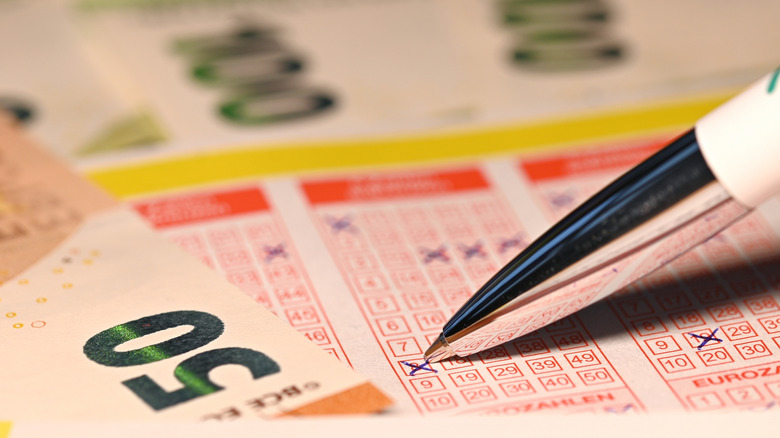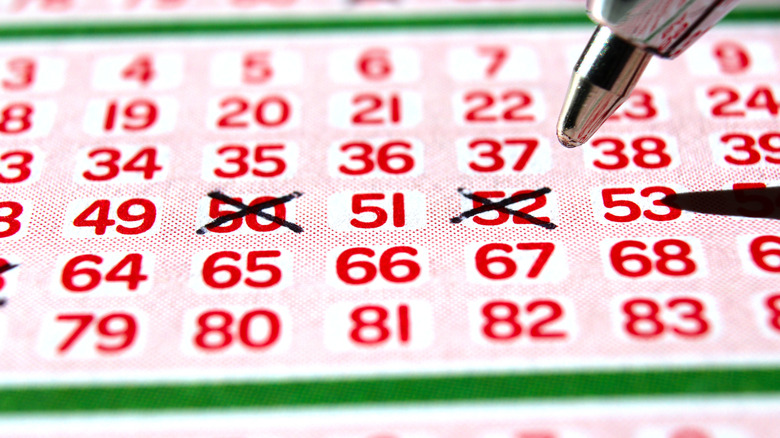You've Been Warned: Buying Lottery Tickets With A Credit Card Could Cost You
The lottery craze is one that routinely creeps into the public consciousness. Every few months, the jackpot prize goes unclaimed for long enough to build into a ludicrous sum. If you've ever driven past a sign on the highway advertising a prize in the hundreds of millions (or even billions), it's only natural to consider buying a ticket to get your name in the hat. After all, the typical lottery ticket costs $2 to play, and for that minuscule price tag you have a chance — albeit a shockingly small one — to walk away as a newly minted one-percenter.
Most consumers won't see the harm in buying a ticket every once in a while and might even consider joining a lottery pool. Generally, this remains true, but there are some insidious realities hiding beneath the surface when thinking about the lottery. In particular, it's almost always a bad idea to purchase a ticket with your credit card. If you're buying yours at a grocery store, you might already be using this card to do your shopping. This allows you to accumulate cash back or rewards points on a spending category that's unavoidable within your budget. But if you're throwing in a lottery ticket, it's important to understand that two factors may be working against you. First of all, lottery entries may be classified as something other than a standard purchase by your card issuer, leading to additional charges. Then there's the nature of gambling itself to contend with.
Playing the lottery is a form of gambling and can lead to poor financial habits
Potentially the most pressing issue that a lottery player faces is the reality that this activity is gambling wrapped up in a different package. Buying a ticket doesn't feel the same as betting on games or even purchasing lottery scratch cards (after checking the state lottery website, of course), but the game of chance remains a gamble nonetheless. The average American adult spends $338 each year on lottery tickets. That averages out between one and two tickets each week over the course of a year (for a minimum $4 Powerball ticket). Cutting this expense out of your budget might not feel like a big change, but added up that $338 value sunk into gambling outlets can make a big difference elsewhere. Spread over the course of a month, the average spend translates into nearly $30. That's almost half the average U.S. internet bill.
Your odds of winning the lottery are exceedingly slim. Winning anything at all features odds of about 24 to one, while making off with a Mega Millions jackpot stands at over 300 million to 1. Even with strategies to improve your odds, continuing to buy lottery tickets on a regular basis remains a great way to find yourself stuck in a gambling loop. When you pay for this habit with a credit card, the potential to see the purchase roll over from one month to the next only amplifies the losses when interest kicks in.
Some credit card companies may ring transactions up as cash advances
One massive issue you might experience here comes in the form of how your card issuer treats the transaction. Not all expenditures are classified the same. When you swipe your card to buy something, it adds to the total bill you owe, but when making certain purchases or using your credit card in an ATM, these transactions are classified as cash advances rather than standard purchases.
The difference might be slim, but cash advance transactions tend to feature a higher interest rate, meaning if you allow the expense to roll over into the next month you'll be paying an even greater premium than the interest assessed on your regular balance. More importantly, many cards deal with paying off these transactions after applying your payments to the regular purchase pool. This can mean that the highest interest expenses sit at the back of the line and continue to accrue interest each month even if you're diligently working to clear the debt (although others don't, so reading your specific cardholder terms is important).
Lottery tickets are usually considered a cash advance transaction instead of a routine purchase. This makes using your credit card for this expense can easily become something of a slippery slope that adds exponentially to the cost of your borrowing. If you are going to invest in a ticket ahead of a big draw, it's always best to use cash or a debit card.


